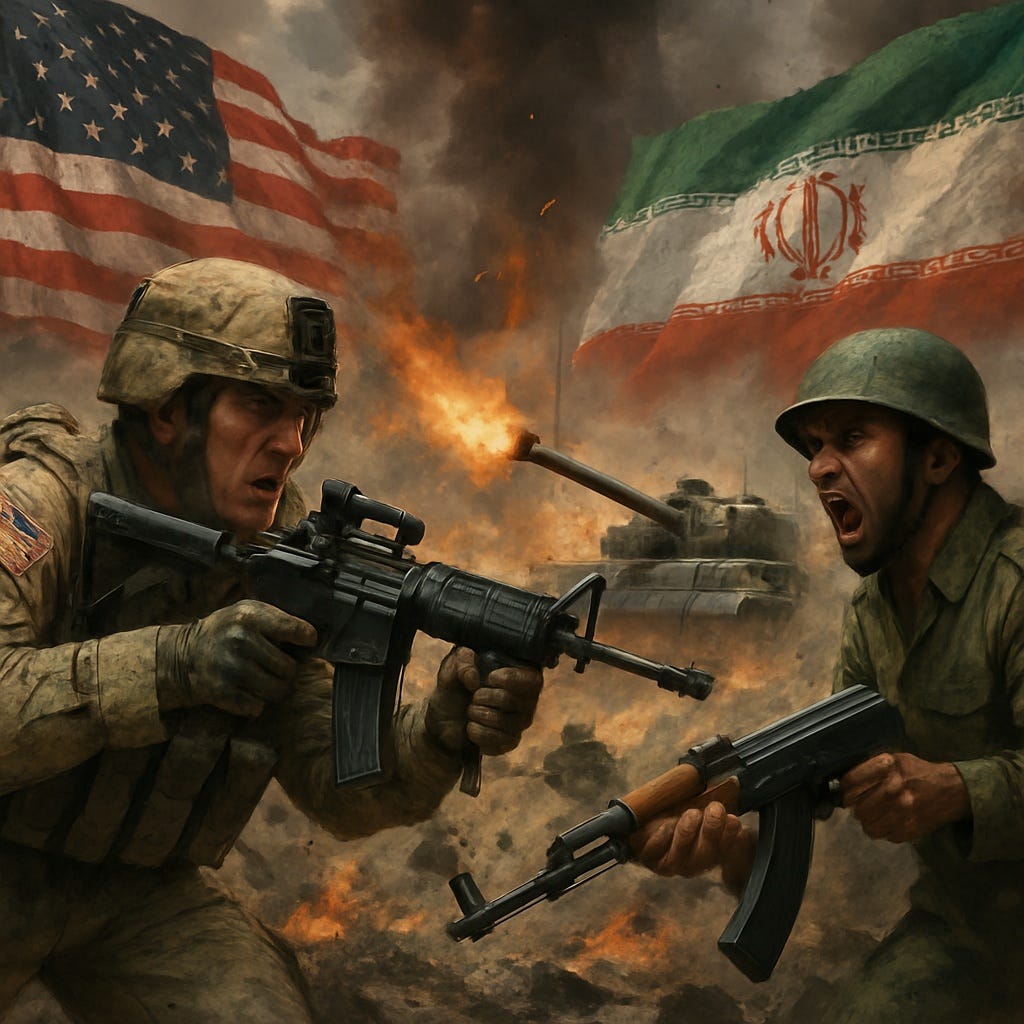The War President Trump Made Inevitable
The U.S. may be in another long war in the Middle East due to bad judgment
A broad majority of Americans can agree on a couple of aspects of the conflict with Iran. First, the U.S. Armed Forces executed its complex mission in Operation Midnight Hammer magnificently and with precision. No one should underestimate the might and lethality of American joint forces.
Next, I think that most people will generally agree that the strike on Iranian nuclear facilities has set back Iran’s ability to refine fissionable materials, perhaps for years (though it was not completely destroyed).
Third, we can agree that Iran should never have nuclear weapons. Iran is a pariah theocracy that promotes terrorist networks worldwide and has dedicated itself to the destruction of Israel and America. Most of the entire world agrees that Iran should not have nuclear weapons.
As a matter of fact, most of the world did agree that Iran should not have nuclear weapons. That agreement came after the UN Security Council and President George W. Bush imposed initial sanctions against Iran for violating the Nuclear Non-proliferation Treaty (NPT). Those sanctions were not effective enough, so President Obama followed up with crippling secondary sanctions that required foreign companies and banks to leave Iran. Any customers of Iranian oil were threatened with being cut-off from access to the U.S. if petroleum purchases continued. Additionally, the U.S. had frozen billions of dollars of Iranian money for violating international treaties.
These enhanced sanctions cratered the Iranian economy, dependent as it is on oil revenues, with a decline in nearly one and half million barrels per day in exports. The recalcitrant Iranian regime came to the negotiating table and, after two years of negotiations, the result was the Joint Comprehensive Plan of Action (JCPOA). The Center for Arms Control and Non-Proliferation evaluated the 159-page agreement as one in which “Iran significantly reduced its nuclear program and accepted strict monitoring and verification safeguards to ensure its program is solely for peaceful purposes.”
One remarkable aspect of the effectiveness of the JCPOA was the concord among bitter enemies: Russia, China, and the U.S. Additional signatories included France, the United Kingdom, Germany, and twenty-seven other nations acting through the European Union. Signed on July 14, 2015, the JCPOA went into effect only after the International Atomic Energy Agency (IAEA) verified that Iran had completed its required measures.
What did Iran have to do? The IAEA verified that Iran sent 25,000 pounds of enriched uranium out of the country. That reduced Iran’s stockpile of enriched uranium by 98%. Iran had to agree to keep any and all uranium enrichment to only 3.67%, the level used in civilian reactors. It disassembled and removed two-thirds of its centrifuges. Iran agreed to intrusive, continuous monitoring and surprise inspections.
Before the JCPOA in 2015, U.S. intelligence services estimated that Iran already had enough uranium and equipment to create 8-10 nuclear weapons, and it would only take a couple of months to do it. JCPOA pushed the amount of time for Iran to develop nuclear weapons to at least a year and that status would stay in place for at least 10 years. For the 28 months that the JCPOA was in effect, the IAEA found that Iran did not violate the agreement, except for some minor “infractions” that were corrected.
In other words, diplomacy worked. The coalition to sanction Iran worked. The JCPOA worked to vastly reduce Iran’s capability to produce nuclear weapons. Unlike some other nations’ leaders who claimed Iran was in violation, the IAEA had no axe to grind in thoroughly inspecting Iran and reporting on its nuclear program compliance.
So, why did President Trump unilaterally pull the U.S. out of the JCPOA in 2018 and re-impose sanctions? One reason.
Bad judgment. Bad judgment we are still living with.
Iran perceived that the U.S. had lied to them, backing out of a deal with which Iran was compliant and reimposing sanctions. Western nations felt betrayed and astonished. Iran began refining uranium again far above the purity needed for nuclear energy, much closer to weapons-grade. Acting alone, U.S. sanctions did not have the same effect on Iran.
Opponents of JCPOA criticized it for not addressing Iranian-sponsored terrorism and for not reducing Iran’s missile program adequately. Trump’s re-imposition of economic sanctions did nothing to stop or improve either of those issues. The first Trump Administration also had disagreements with the “sunset” of certain restrictions after ten or more years, but in effect, Trump caused the sun to set on them instantly. The U.S. got nothing for withdrawal from the JCPOA.
Trump proposed negotiations with Iran coupled with threats of military action and demands for capitulation, which only reminded Iranian leaders of their distrust of his previous actions.
Given a broad consensus by Western nations, Israel, and Sunni Arab nations that Iran should never have nuclear weapons, Trump’s dismissal of the JCPOA made a war to take out its nuclear capabilities inevitable.
In 1941, the Imperial Japanese Navy, viewing U.S. economic sanctions as destroying its military capability and ambitions, carried out its attack on Pearl Harbor to destroy the U.S. Pacific Fleet. It failed, but Japan expected that the attack would demoralize the U.S. and cause inaction in response. Perhaps they even expected negotiations. Japan made a stupendous miscalculation. Bad judgment.
Admiral Isoroku Yamamoto, who helped plan the attack on Pearl Harbor, famously said,” I fear all we have done is to awaken a sleeping giant and fill him with a terrible resolve.” President Trump called on Iran to return to the negotiations table, but it is much more likely that these attacks have filled Iran with a terrible resolve to achieve, by whatever means, nuclear weapons. A bill is pending in the Iranian Parliament to withdraw from the Nuclear Non-Proliferation Treaty. The Iranian Parliament is moving forward with a plan to suspend any cooperation with the IAEA and its inspectors. Soon, we will know far less about Iran’s nuclear weapons program.
We are at war with Iran, despite the Vice President’s nonsensical claim that we are only at war with Iran’s nuclear program. This is Trump’s War, and though we executed a surgical strike, the war that Trump got the U.S. into has yet not concluded. Already, Iran has retaliated by attacks on U.S. forces in Qatar. We should not expect regime change; in fact, the U.S. attacks are more likely to generate a “rally-round-the-flag” effect, strengthening the hardliners in Tehran. The Iranian Parliament has voted to close the Straits of Hormuz, which will have a significant effect on oil prices and global economies. Will Iranian-backed terrorists detonate a nuclear dirty bomb somewhere? Where will other attacks happen?
We are at war with Iran, and it is not over. Trump’s bad judgment in 2018 made this war inevitable. Let us fervently hope that better judgment will prevail going forward, but this day and night, my thoughts and hopes are with the members of our Armed Forces, deployed abroad, at sea, and here at home. We are at war.
Jamie Barnett is a native Mississippian and a retired rear admiral in the U.S. Navy, having served 32 years. He served as Chief of the Public Safety and Homeland Security Bureau of the Federal Communications Bureau. He is currently an adjunct professor of national security. The opinions expressed in this article are the author’s alone and are not expressions of the views of any of the organizations with which he is associated






